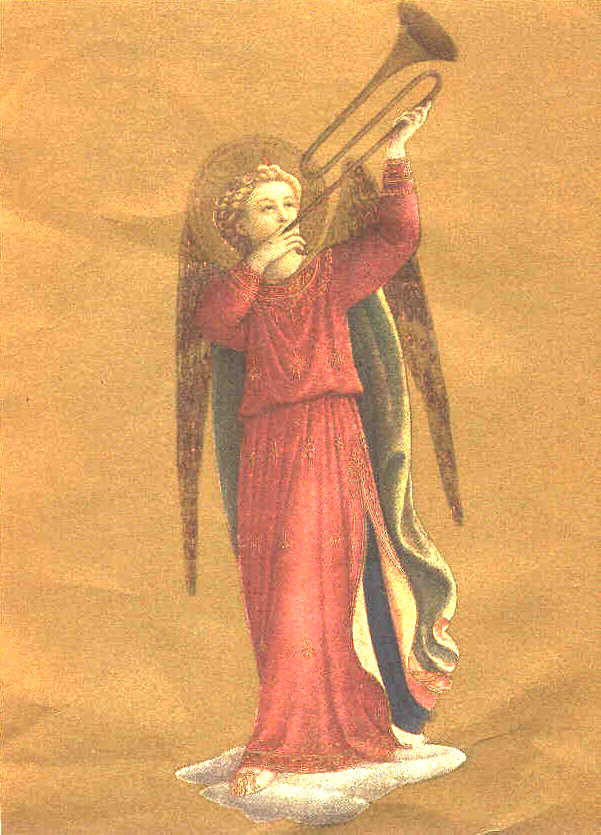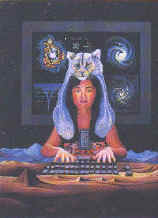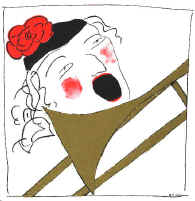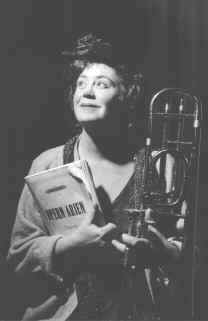|
Abbie Conant and William Osborne's Southeastern USA Tour 2002
See the new interview with Abbie on the "On-line Trombone Journal"
Biographies of Abbie & William To "The Wired Goddess and Her Trombone" Page
On February 21st, 2002, the world-renowned trombonist, Abbie Conant, and her husband, composer William Osborne, will make a 18 city tour of the Southeastern United States. They will travel with three hours of repetoire comprising two programs. The first first program is of works for trombone trombone and computer that have been written for their project called "The Wired Goddess and Her Trombone." The second program will be comprised of their music theater works.
The "Wired Goddess and Her Trombone" is their project designed to encourage the creation of new works for trombone and computer based on the theme of the Goddess in her many manifestations. To date 28 works have been written or are in progress of which Abbie has already premiered 14. Some are turning out to be truly fine additions to the repertoire. Their programs will include works by five distinguished American women composers who teach at some of America's most famous music schools:
They will travel with their own 600 pound surround-sound system that provides the highest quality sonic effects. This concert is an opportunity to hear one of the world's finest trombonists performing exciting new literature.
Southeastern USA Tour Itinerary (T
= music theater program; G = Goddess Program) G
-- February 21-22
Denison University
Granville, Ohio T --
February 25
Morehead State University
Morehead, Kentucky G,T --Febraury 28
East Carolina University
Greenville, North Carolina G --
March 4
U. of Maryland, Baltimore County Baltimore, Maryland G-- March 7 Virginia Commonwealth University Richmond, Virginia T
-- March 10
Lenoir-Rhyne College
Hickory, North Carolina G --
March 11
Virginia Technical University
Blacksburg, Virginia *
March 12
University of Maryland
College Park, Maryland G --
March 14-16
Eastern Trombone Workshop
Washington, DC G --
March 19
University of Virginia
Charlottesville, Virginia G --
March 20
Univ. of North Carolina, Chapel Hill
Chapel Hill, N.C. Chapel Hill T
-- March
26
University of Tennessee, Knoxville
Knoxville, TN Knoxville
T
-- April 1
University of Tennessee, Chattanooga
Chattanooga, TN T
--
April 4
Valdosta State University
Valdosta, Georgia G
--
April 6
University of Florida
Gainesville, Florida T
-- April 8
Columbus State University
Columbus, Georgia * April 11 Georgia State University Atlanta, Georgia G
-- April 14
University of Arkansas
Fayetteville, Arkansas
(*March 12 and April 11 will be trombone masterclasses only.)
This tour is made possible, in part, with assistance from United Musical Instruments.
Program
I: THE WIRED GODDESS AND HER
TROMBONE Music
for the End of Time
William Osborne (1998) The
Elderberry Goddess
Elizabeth Hoffman (2000) Hysteria
Cindy Cox (2001) Time
Bomb
Chris Brown (1999) Landmine
Anna Rubin (2001) Sauger
Anne LeBaron(2001) Hum
2
Maggi Payne (2000) Love Song Without Words Nancy Dowlin (2000) Program II: MUSIC THEATER AND DRAMATIC TONE POEM
Street Scene for the Last Mad Soprano William Osborne (1997) (Intermission) Music
for the End of Time
William Osborne (1998)
Brief
Program Notes: WILLIAM
OSBORNE -- "Music for the End of Time" for trombone and
quadraphonic tape in six movements based on the the _Book of Revelation_.
The electronic music of the surround sound creates a sonic environment
in which the trombone is the central figure.
Conant's performance reveals all aspects of the trombone, ranging from
expressions of "divine wrath," to wild rhythmic unisons with the
Four Horsemen of the Apocalypse, to the gentlest, meditative lyricism. Here
are the movements with hyperlinks to sound files (each about 1 megabyte): I.
A Door Was Opened In Heaven II.
The Sea of Glass III.
The Four Horseman IV.
As It Were of a Trumpet Talking VI.
A Woman Clothed with the Sun ELIZABETH
HOFFMAN -- (New York University) "The Elderberry Goddess"
for trombone and two track playback. An updated version of Hans
Christian Anderson's fairy tale with a highly intricate and beautiful score
composed with C-sound. The work
touches upon the themes of the story: connectedness to the natural world,
valuing of accumulated human relationships, a closeness to nature.
The spirit of "Mother Elderberry" emerges from a teapot of
elderberry brew. Flowers and a
tree appear holding the Elder Mother who becomes the "child of
memory." Under the tree an old couple reminisce about the beauty of
youth. Remember love?
Suddenly, the old couple remembers they the left the burner on.
At least they had their memories. CINDY
COX -- (UC Berkeley) "Hysteria" for trombone, spoken text, and
quadraphonic tape. Hysteria
is the Greek word for womb. The text by the composer's poet husband, John
Campion, explores the meaning of the word in several languages and provides
the basis for this highly dramatic and profound work composed with ProTools
and Audiosculpt. CHRIS
BROWN -- (Mills College)
"Time Bomb: Two Poems by Mina Loy" for trombone and interactive
electronics (using the software "SuperCollider.") The two poems are from Mina Loys late work, a collection
entitled "Compensations of Poverty".
The instrumentalist controls with her pitch and volume the granular
playback of recordings she made speaking the two poems.
An interaction develops between the acoustic sound and the electronic
sound it engenders. The trombone
"speaks" the poems. ANNA
RUBIN -- (Oberlin College) "Landmine",
for trombone, two track tape and live electronics.
The digital audio, which incorporates fragments of texts about
landmines, was assembled in ProTools, using original sounds programmed on the
Kurzweil 2000. Speech sounds were
altered in SoundHack and/or by the use of various ProTools plug-ins. This performance will include three of the works six parts. ANNE
LEBARON - (Cal Arts)
"Sauger" for trombone and quadraphonic tape.
Specifically written for Abbie Conant, who played an active part in the
realization of the piece, "Sauger" joins an instrument that is blown
with an appliance that sucks. Both the title and the music of
"Sauger" play with the multi-dimensional, and often conflicting,
attitudes toward domesticity, housework, and entrapment.
Raw source materials used in Sauger are simply a vacuum cleaner and,
occasionally, a food processor. Internal rhythms from the sucking sounds of
the vacuum determine more external rhythmic phrases, which are contrasted with
and extended by a drum track. The work was composed using Pro Tools and a
Kurzweil 2000 synthesizer. MAGGI PAYNE -- (Mills College) "Hum 2" for live trombone and 7-track tape. Each autumn the Japanese goddess Tatsuta-Hime weaves a beautiful multicolored tapestry, then incarnates herself as wind and blows her own work to shreds. The seven-track tape is a prerecorded overdub of seven additional trombone parts played on a Surround-Sound system. (See the composer's comments about the work.) NANCY DOWLIN -- "Love Song Without Words" is a work for trombone and guitar as gorgeously beautiful as it is simple.
WILLIAM
OSBORNE -- "Street Scene For the Last Mad
Soprano", a music theater
work for performance-artist and quadraphonic sourround-sound, demonstrates the
wide range of Conant's artistic skills as instrumentalist, singer and actress.
Imagine a down-and-out soprano living among the dumpsters behind the
Met. Tomorrow is her big audition
at the Opera House if only she could think of what to perform.
She colors her world with opera excerpts, grandiose Swan Songs and
virtuosic escapades on her instrument-- but as she makes preparations for her
final big audition, we see that the brutality of the street has long since
caused the borderlines between life and opera to blur.
In a word, "Street Scene for the Last Mad Soprano" explores
the belief that cultural identity is necessary for survival and that it is a
way of confronting our human condition. For
more details and additional photos of this work see:
http://www.osborne-conant.org/Street.htm
|



